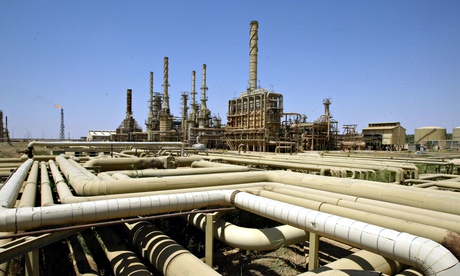
As fighting raged around Iraq's biggest oil refinery on Wednesday, hundreds of cars queued for hours at petrol stations in Irbil and Kirkuk. Iraqi Kurdistan has so far escaped violence, but supplies of petrol are running low. The shortage is rumoured to have been caused by locally produced fuel being smuggled into Mosul and other affected areas. On Wednesday, prices more than doubled in the course of the day.
The growing threat of civil war is unnerving residents in Kirkuk and Baghdad – but it should also worry consumers around the world. Iraq is one of the world's key oil producers, and until recently its growing crude exports had helped to keep global petrol prices from rising too high, .
The crisis caused by the sudden advance of the Isis insurgents has driven world crude prices past $114 a barrel in recent days and led to warnings of shortages from industry experts. Iraq has always been a major producer, but has increased its output in the past year, at a time when other exporting nations such as Nigeria and Libya have seen supplies reduced due to their own domestic problems.
Earlier this year, the Organisation of Petroleum Exporting Countries (Opec) predicted that 60% of the oil cartel's future production growth to the end of the decade will come from there. This now seems in doubt - at a time when global demand continues to grow as Europe moves out of recession and the economies of energy-hungry developing nations such as China and India continue to forge ahead.
Output from Iraq reached an all-time high of 3.5 barrels a day earlier this year and remains at a high level but output is hampered by a lack of export capacity made worse since a northern pipeline was blown up.
The key oilfields in Iraq have largely escaped the real impact of the fighting because they are located in the south of the country. But threats to oil workers of kidnapping, coupled with corruption and equipment shortages, have already hampered their development. Now the attack on Baiji has forced the closure of 300,000 barrels a day of refined petroleum products, not only used for cars but also for producing fuel to power Iraq's electricity network. The country's regular blackouts, therefore, seem destined to become more frequent.
The seizure of Kirkuk by Kurdish fighters strengthens Kurdistan's hand in its verbal battle with Baghdad over its right to export its own crude. Kurdistan is producing 250,000 barrels of oil a day from oilfields operated by western companies such as Enel, whose chief executive is the old BP boss Tony Hayward. Baghdad does not recognise the Kurds' right to export without a full agreement in place between the two and has been threatening buyers with legal action.
The Kurdish regional government said on Wednesday that it was looking at connecting the Kirkuk oil hub with its own export pipeline to Ceyhan in Turkey, but accepted that it needed an agreement with Baghdad first.
Interactive Investor, a London stock broker, said last night that the increasing "independence" of Kurdistan over a weakened Iraqi state should lead to more oil from that region, which could help prevent a further rise in prices.
Meanwhile, BP, which produces 1.4m barrels a day at Rumaila in the south, is monitoring the security situation further south. A spokesman said: "The safety of our staff is paramount, but operations at Rumaila are working as normal." The same could not be said for the petrol stations of Irbil.

